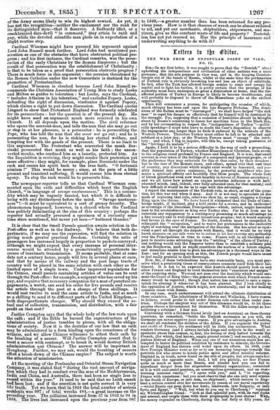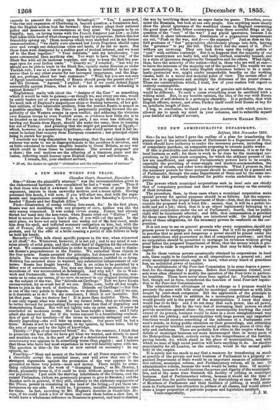Vitus to t itor.
THE WAR PEON AN IINPOPULAB POINT OF VIEW.
NO. IL
SIR—In my first letter, it was sought to prove that the "flourish" abott upholding the independence and civilization of other nations was a mere pretence; that the sole purpose in view was, and is, the keeping Constan- tinople out of the hands of Russia, whilst at the same time the permanence of Turkish rule is obviously bee:ailing less and less an object of solicitude. In fact, after the Turk has allowed foreign armies to come and occupy his capital and to fight his battles, it is pretty certain that the prestige of his authority must have undergone so great a diminution at home, that the dis- affected portion of Turkey in Europe is likely to become troublesome, and will probably be disposed to throw off the Mussulman yoke at the earliest opportunity. Then will commence a procees, for anticipating the occasion of which, much obloquy has been cast upon the late Emperor Nicholas. The domi- nions of the Sultan must be "rearranged" ; we shall have helped " the sick man " to repel his danger so effectively that he himself will be destroyed in the struggle. For, supposing that a cessation of hostilities should be brought about by Russia's cementing to lessen her maritime force in the Black Sea, and by her covenanting to respect the "independence of Turkey —politi- cally speaking—I must take leave to doubt the Czar's disposition to observe the engagement any longer than he finds it enforced by the attitude of the Western Powers. Therefore Turkey must either be left to be attacked and subdued at a later day, or the Western Powers must " occupy " the terri- tory: and what, I beg to inquire, will this be, except taking possession of. the "heritage du malado" ?
Again, I hold it to be a serious difficulty hi the way of such a proceeding, that the population of Turkey, whether Mussulman or Christian, feels averse to the religious creed professed by France and England. It is true, that small account is ever taken of the feelings of a conquered and ignorant people, or of the preference they may entertain for this or that ruler, by their invaders :
but in the ease of the Romaie races, and-others, spread that vest tract of country, any discontent which might exist would be fomented, and pos- sibly fanned into active resistance by the powerful neighbour who pos- sesses a spiritual affinity and headship aver these people. The whole body of Greek priesthood even now work heartily in favour of Russian ascendancy ; and we all know how potent an engine sectarian influence is with half- educated minds, (and, indeed, over fully-educated ones, for that matter,) and' how difficult it would be for us to cope with this advantage. I regard the maintenance of the Turkish rule, in short, as out of the ques- tion, let this war end when it may. And it is not easy to speculate on the mode of replacing that, rule, otherwise than by, as usual, clapping a foreign King upon the throne. We have heard it whispered that the Dukeof Cam-. bridge might, if inclined, play a bold stroke for a crown, and be enthroned as sovereign of the Danubian Principalities—which, iodeed, might hereafter. lead to his establishment as King over Turkey also. Far be it from me to entertain any repugnance to a contingency promising so much advantage to a fine country and to well-disposed industrious peoples ; but it would scarcely find favour in the eyes of Franco. No doubt, Austria must be compelled to relinquish the " occupation,' and to waive her pretensions to the exclusive right of watching over the navigation of the Danube. She has acted so equi- vocal a part all through the dispute with Russia, that it would be no very harsh measure on our side were we to refuse to let her exercise any authority. over the Principalities in time to come. France will in all likelihood ex- pect to receive some advantage from the " settling " of the affairs of Turkey, and nothing would suit the Emperor better than to establish a military post on the Bosphorus, such as might constitute the nucleus of a future empire, and meantime enable him to push his advantages in a thousand ways in the East : and for an opening such as this, the French people would have cause to feel really grateful to their Sovereign. Now, Sir, if these vaticinations have any reasonable basis, you must per- ceive what a perplexing tissue of consequences connects itself with their ful- filment. It is not to be expected that Austria should quietly look on and allow France and England to erect themselves into "executors and assigns" of the expiring state. We must not pass over the hostility which would ani- mate the Court of King Otho—the general aversion with which Freach amen. daney would be regarded ; though that nation has contrived to earn a repu- tation for abusing it wherever it has been planted. But I look chiefly to the opposition of Austria, which might, not unnaturally, end in her making common cause with Russia.
In any case, much embarrassment will attend the ultimate distribution of those countries. The inhabitants of Moldavia and Wallachia, I have reason to believe, would prefer to fall under Russian rule rather than under Aug-, trian. Perhaps the simplest way out of this dilemma would be, to let those peoples choose a Government for themselves. Will the Allies accept so hu- miliating a solution? I fear not.
Conversing with a German friend lately (not an Austrian) on these thorny questions, he remarked, "Settle the Turkish succession as you will, we Germans can never approve your course. If you give advantages to Austria,. we shall all condemn the decision of the Allies. I.f you augment the ..vrer and credit of France; the sentiment will be little lees acrimonious. What renders Germany (and I always include kings and subjects in the word) so apathetic about this contest, is, first, the feeling of deep hatred towards the, French, (for which, God knows, tim exists!) ground exts!) and secondly, a cold, jealous distrust of England. When any one of our numerous states has at-, tempted to better its political condition by resistance to misrule, the Govern- ment of England has thrown cold water upon its efforts. In 1848, your then Foreign Minister went so far as to use menacing language towards the patriotic few who strove to kindle public visit and effect needful reforms. England is, in truth, never found on the side of peoples, but always casts her weight into the opposite scale. And, I tell you plainly, we fear France quite as much or more than Russia, and wonder how you can fail to apprehend danger from her stupendous military organization; connected as it is with anti-social passions, an unscrupulous government, and an over- weening national vanity. "I agree with you," said I, "in regarding France with uneasiness : but you must observe that she OM only send armies to the South of Europe, or into Asia, on shipboard, which insure, to Eng- land a certain control over her movements by reason of our naval superiority —whilst Russia can pour down her hosts, landwards, into Bulgaria, or into
Syria and Egypt." Well, but what do you say to Cherbourg? " rejoined
my Wirtemburgher friend ; "look at that splendid port, with its vast docks and arsenal, and couple these with their propinquity to your shores! Why, the money expend -W'on Cherbourg, during the last forty or fifty years, far exceeds in amount the outlay upon Sebastopol !" "Yes," I answered, "the rise and expansion of Cherbourg is beyond question, a formidable fact. But the English seldom look fax forward ; they always adapt their national policy and measures to circumstances as they arise. We happen to be on friendly, nay, on loving terms with the French Emperor just now ; so John Ball takes little heed of what changes may by and by supervene. Before this hot friendship sprang up," [from motives which were sketched out in my former communication,1 "we really were alarmed lest Louis Napoleon should come over and ravage our defenceless cities and lands, if he did no more. But these fears were dissipated by a sudden gust of mutual interest, and we went off to the East together." "Your interests," said my interlocutor, "are more commercial than anything else. You want to have 'the run' of the Black Sea with all its immense supplies, and also to keep the Red Sea pas- sage open for your Indian trade." "Exactly so," I retorted ; "but why we should not be able to trade in the Black Sea, equally under Russian as under Turkish rule, I am at a loss to guess. Russia is more indebted to her com- merce than to any other source for her increased importance, and the Eng- lish are, perhaps, about her best customers." "Well, but you are not sure of Egypt continuing unmolested, if Russia should grasp the parent state ?" said the German. "Agreed," I replied; "but if we could defend Egypt mtecessfully against France, what is to make us incapable of defending it against Russia ?" Englishmen really talk about the "designs of the Czar" as something which it would be vain to gainsay,—as though we, and every one else, would 'be easily beaten out of every possession which he might think fit to attack ! No more talk of England's magnificent ships or floating batteries, of her gal- lant soldiers, of her admirable artillery, from the instant Russia is named as a possible assailant. Yet the Times is perpetually putting forward the su- periority of the Western armies in open conflict, and adducing the victories over Russian troops by even Turkish arms as evidence how little she is to be dreaded as an attacking foe. For my pert, I see even less difficulty in barring out Russia from Egypt, should she make the essay, than in keeping her out of Turkey. And granting that she might get possession of Egypt,— which, however, is a monstrous hypothesis,—she would never find it her in- terest to isolate that country from European commerce ; her principal object being to enrich her people.
I conclude my long disquisition by repeating, that the real objects of this ruinous war seem to me as disproportionate to the sacrifices it involves, and as little calculated to realize tangible benefits to Great Britain, as any war which could in these times be undertaken. The avowed purposes* are a sham ; the real motives are the offspring of a timorous panic and de- lusion, reflecting small honour urn English dignity and self-reliance. I remain, Sir, your obedient servant, H. G.
• Id eat, the desire to uphold" civilization and the independence of nations."



































 Previous page
Previous page